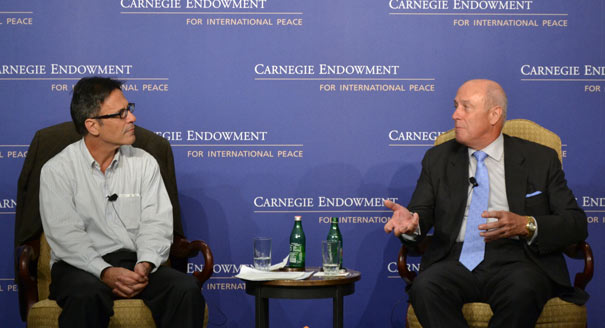Registration
You will receive an email confirming your registration.
IMGXYZ3934IMGZYXIt is widely accepted that China’s growth model has led to unsustainable internal imbalances and rising debt. Indications are that the new government is serious about rebalancing China's economy away from its over-reliance on investment. However, historical precedents suggest that this will be very difficult and may involve many years of much slower growth and rising uncertainty.
Carnegie’s Michael Pettis identified four ways in which China can rebalance its economy, analyzing the implications for each. Douglas Paal moderated.
Current State of China’s Economy
- Investment-driven Growth Model: China’s march to miraculous double-digit GDP figures was primarily driven by state-sector investments, Pettis explained. This model of growth favors heavy industries and infrastructural projects that lead to rapid growth.
- Excessive Savings: This investment-driven growth model has favored the growth of the state sector at the cost of the household sector, Pettis continued. Along with an undervalued currency, low wages, and a financial repression “tax” on savers, consumers in China are bound to extremely high levels of savings to offset an absent social safety net. By extension, this means that consumption plays a growing but relatively minor role in China’s GDP growth, a pattern that will continue if China’s economy does not rebalance toward greater consumption and less investment.
- Unsustainable Investments: Due to the high levels of investment over the past couple of decades, additional capital spent on investment will lead to diminishing benefits, Pettis warned. Resources become poorly allocated and inefficiencies arise, making the investments less and less viable.
- Debt: As this investment-driven model continues, the level of debt used for heavy investment projects will surpass their servicing-capacity, leading to more illiquidity in the banking system and ultimately, a significant debt problem, Pettis concluded.
Ways the Chinese Economy can Rebalance:
- Immediately raise the value of the renminbi, interest rates, and wages. Pettis conceded that this would definitely and significantly rebalance the economy, but at a very significant cost to Chinese society by increasing unemployment in the export sector. It would add such financial distress to the country that widespread bankruptcies and social instabilities may occur, he warned.
- Slowly raise the value of the renminbi, interest rates, and wages. China has the ability to slowly moderate the rise of its currency, its interest rates, and its wages. However, Pettis argued that it is too late for this to have any significant benefits for the Chinese economy. He noted that had the Chinese government chosen this policy, it should have begun enacting it around 2005.
- Transfer assets from the state sector to the household sector. Since the state sector in China has grown at a significantly faster pace than that of GDP over the last few years, Pettis argued that privatizing state sector assets and passing them unto the household sector will significantly assist the country in rebalancing its economy. However, he noted that there could be resistance from wealthy elite families who have stakes in state assets. This is harder to do when growth is slow than when fast.
- Remove debt from the private sector. China can also remove a significant number of private sector debts and take the toxic loans onto its own balance sheets. However, this may present a heavy debt burden for the Chinese government in the long-term, Pettis acknowledged.
Pettis concluded that the Chinese government is likely to practice a combination of these last three policies as it works to rebalance its economy.
